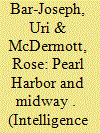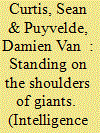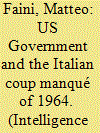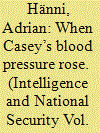|
|
|
Sort Order |
|
|
|
Items / Page
|
|
|
|
|
|
|
| Srl | Item |
| 1 |
ID:
149299


|
|
|
|
|
| Summary/Abstract |
This paper aims to examine the relevance of intelligence gathering as an essential prerequisite for any political or military decision, and the resulting special relationship between rulers and spies, through a theoretical comparison between renowned classics and niche literature on strategy, literature, philosophy and political science belonging to several periods and historical contexts. Findings suggest that criticism on intelligence does not concern its utility, but rather the reliability of the sources, the obstacles presented by intelligence gathering and the ethics of spying. Spies are often described as ‘ramifications’ of the ruler, to whom they are tied by a special relationship of trust, rooted in a spirit of sacrifice, adequate remuneration and honours.
|
|
|
|
|
|
|
|
|
|
|
|
|
|
|
|
| 2 |
ID:
149294


|
|
|
|
|
| Summary/Abstract |
Beginning with the attack on Pearl Harbor, the war in the Pacific was a largely losing campaign for the Americans until the Battle of Midway, on 4–5 June 1942. The American ability to predict this Japanese attack the second time around served as the turning point for the war in the Pacific. And the story of how the Americans turned a catastrophic failure into an impressive cryptological achievement involved the story of one man, Joe Rochefort, convincing another man, Admiral Chester Nimitz who commanded the Pacific Fleet, that he could trust his analysis of the intelligence he compiled and analyzed.
|
|
|
|
|
|
|
|
|
|
|
|
|
|
|
|
| 3 |
ID:
149296


|
|
|
|
|
| Summary/Abstract |
Reducing uncertainty is a central goal of intelligence analysis. 'Reducing uncertainty' can mean (1) reduce ignorance or ambiguity or potential for surprise in describing situations or intentions, or (2) reduce adverse impacts of ignorance, ambiguity or surprise on decision outcomes. We make two claims. First, the second meaning needs greater attention in intelligence analysis. Uncertainty itself isn't pernicious, but adverse impact of surprise is. Some policy options are less vulnerable to uncertainty than others. These less vulnerable (i.e. more robust) options can tolerate more uncertainty. Analysts should identify policy options that are robust to uncertainty. Second, reducing the impact of uncertainty requires awareness of policymakers' goals. This needn't conflict with analysts' policy neutrality. Tension between neutrality and involvement arises in economics, engineering, and medicine. The method of info-gap robust-satisficing supports decision making under uncertainty in these and other disciplines. Implications for intelligence analysis are explored in this paper. We discuss the assessment of Iraqi WMD capability in 2002.
|
|
|
|
|
|
|
|
|
|
|
|
|
|
|
|
| 4 |
ID:
149297


|
|
|
|
|
| Summary/Abstract |
Among all the controversial New Religious Movements to emerge since the Second World War, the Church of Scientology has arguably been subject to more scrutiny by domestic and international intelligence agencies than any other non-Islamic alternative religious group. While owing to the nature of intelligence gathering scholarly accounts of this have often been one-dimensional and brief, the situation in Australia resulting from the Archives Act 1983 has meant that historians of both intelligence agencies and new religions now have access to a significant amount of documentation illustrating the interactions between the Church of Scientology and the Australian Security Intelligence Organization (ASIO) for the period from 1956 to 1983. This period witnessed vacillating fortunes for the Church of Scientology which saw it become the subject of legislative bans in three Australian state jurisdictions during the late 1960s, as well as it launching a high profile, but ultimately unsuccessful, legal case against ASIO in 1979. While never considered a serious security risk by ASIO, the Church of Scientology played a minor role in a number of important events in the history of ASIO particularly during the 1970s, including participating in a wider activist campaign which sought to curtail ASIO’s operations during this period and making submissions to the first Royal Commission into the Australian Intelligence Services under Justice Robert Marsden Hope.
|
|
|
|
|
|
|
|
|
|
|
|
|
|
|
|
| 5 |
ID:
149300


|
|
|
|
|
| Summary/Abstract |
This study takes stock of the field of Intelligence Studies thanks to a quantitative review of all the articles published in the two main journals in the field: Intelligence and National Security and the International Journal of Intelligence and CounterIntelligence. Particular attention is paid to the diversity of the authors publishing in these two journals and the evolution of the issues they discuss. Publications in the field are widely authored by males based in the United States and the United Kingdom who write about Western intelligence and security organizations. Recent years have seen a slight diversification in the field but further efforts will be necessary to develop a more eclectic body of researchers and research on intelligence and national security.
|
|
|
|
|
|
|
|
|
|
|
|
|
|
|
|
| 6 |
ID:
149298


|
|
|
|
|
| Summary/Abstract |
In the summer of 1964, Italian security forces and the President of the Republic attempted to remove the US-backed Italian center-left government. The attempt did not succeed, but the threat to do so was used to curtail the government’s reformist program. This article shows that the State Department and the CIA misunderstood the plans of the Italian President and security officers, dismissing the possibility of a forceful removal of the center-left, despite having a long-standing hierarchical relationship with Italian intelligence. US officials failed because of poor analytic tradecraft and because of two unintended consequences of international intelligence hierarchies: an excessive reliance on liaison over penetrations and the increased freedom of maneuver of Italian intelligence when faced with multiple, competing principals.
|
|
|
|
|
|
|
|
|
|
|
|
|
|
|
|
| 7 |
ID:
149295


|
|
|
|
|
| Summary/Abstract |
This article contributes to the debate on the politicization of intelligence with a case study of a major attempt of politicization that so far largely escaped academic attention: the Special National Intelligence Estimate on the Soviet Union’s role in international terrorism produced by the US Intelligence Community in spring 1981. Despite direct and indirect manipulation by members of President Reagan’s Cabinet, this case differs from those usually discussed in a decisive way – politicization failed. Based on the empirical analysis, a theoretical model of intelligence politicization is introduced that extends Joshua Rovner’s oversell model, which can explain why policymakers demand intelligence support but is insufficient due to its exclusive focus on the consumers of intelligence, by integrating the incentives of intelligence producers and specifying the determinants of whether politicization succeeds or fails.
|
|
|
|
|
|
|
|
|
|
|
|
|
|
|
|
| 8 |
ID:
149293


|
|
|
|
|
| Summary/Abstract |
This article presents findings from the first publicly available survey generalizable to an intelligence agency to explore why analysts use structured analytic techniques (SATs). Mandated by the Intelligence Reform and Terrorism Prevention Act (2004), SATs are simple methodologies supposed to make analysis more transparent and, hopefully, valid. Despite the US government’s investment in training thousands of analysts, there is no solid evidence on how often or why analysts actually use SATs. A survey of 80 analysts and nine follow-up interviews at the State Department’s Bureau of Intelligence and Research reveals a simple, but important, truth: implementing the techniques requires training and compelling evidence they will improve analysis. Other factors, most notably the amount of time pressure an analyst experiences, were not significantly related with the use of the techniques despite anecdotal accounts and conjecture from the literature. Future research should examine other intelligence agencies to cross-validate these findings. If these findings hold in other cases, intelligence agencies should focus on reforming and incorporating evidence into the training process.
|
|
|
|
|
|
|
|
|
|
|
|
|
|
|
|
|
|
|
|
|